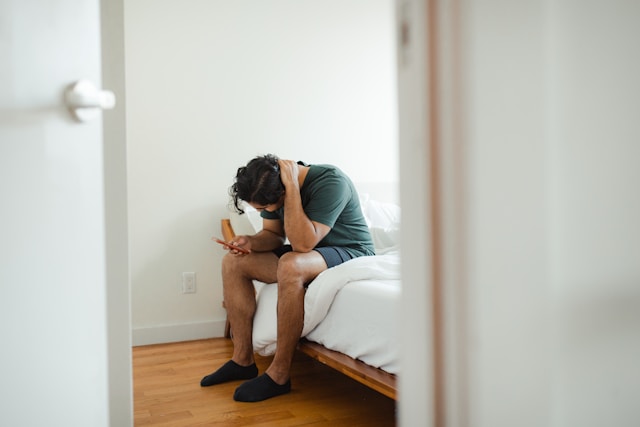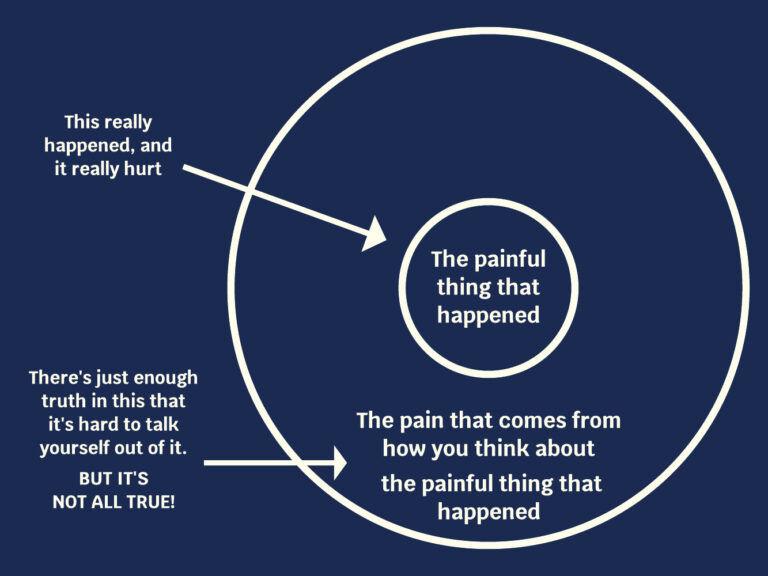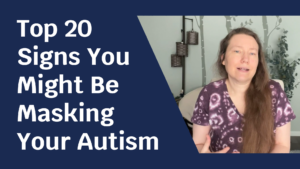
On Trying To Say Just The Right Thing
I’ve been reflecting on my want to be understood, and my fear of not being.
There was a time, not too many years ago, when anxiety was my constant companion, nay-sayer, punisher, and fear monger.
I would spend weeks dreading a phone call I had to make.
I’d put off replying to emails for so long that it got extra weird to reply, and the anxiety compounded.
I’d start projects, and get stuck at all the things that needed to happen in order to make progress, and get overwhelmed, shut down, and emotionally beat myself up about it. And then get irritable, and say the wrong thing to someone, and have something else to ruminate about.
Things that other people consider simple, like cooking, cleaning up, making an appointment, or deciding whether I wanted to go to an event with people (and how), felt so overwhelming, and even thinking about them triggered so much anxiety I’d often do something else instead…or shut down.
I’d avoid grocery shopping until my kitchen looked like Mother Hubbard’s cupboards.

If you’re looking for anxiety relief that actually works for Autistics and AuDHDers, who are later identified/high masking/low support needs…
I’m offering a short course on how to reduce anxiety, both the practical, immediate overwhelm, and then how to deconstruct the underlying thought patterns that keep the rumination going, and the guilt, and shame, and negative self-talk.
I’ve been through this myself, I’m Autistic and ADHD, and lived with moderate to severe anxiety most of my life, until I figured out this framework several years ago, and it’s completely changed my ability to function and work and deal with people, and everything, a bit at a time.
Now I can deal with last minute changes.
And not default to overwhelm when faced with multi-step tasks, or complex projects.
I can have difficult conversations and not ruminate for ages when I say something awkward.
I can deal with sensory stuff better, and the thought that I might go into an environment that might be uncomfortable to my senses, and when I need to, I can make a change that will help me, or let myself off the hook and leave, or ask for what I need, without my anxiety spiking at the thought of any of that.
And so much more.
It’s often little day to day things, but those add up to real, positive improvements in my life.
And makes it easier for me to deal with the big things, when I choose to.
This is the same framework, and the same techniques, that I teach my private coaching clients, distilled down to their essence, in a systematic way that’s easy to understand and put all into practice in the real life circumstances you’re struggling with.
If this is of interest, all the details are at http://www.autismchrysalis.com/anxiety, and the link is in the description and the first comment as well.
Wishing you a neurowonderful day.

When I had something scheduled, like an appointment, or a repair tech coming over, or a package to be delivered, I would spend all day on tenterhooks, waiting for that time, unable to do anything else, even when it was hours away.
When I was working, I was constantly afraid of what other people were thinking about me. Did I say something wrong? What did that comment mean? Why didn’t she ask me about that project? What if she does? What should I say? What are they thinking about me? Am I about to be fired? What if the next round of layoffs gets me, and I can’t get another job?
And I’d compare myself endlessly to where I thought I “should” be at that point in my career, to how many different tasks other people could juggle, or how much they made, or how much they could do after work, and wonder what was wrong with me, and why could everyone else manage so much better than I could?
And when I did get praise, it was often because I was ridiculously good at certain things other people found hard, not because I felt like they liked me or wanted me around. So I still felt in danger all the time.
Job hunting was a minefield of anxieties: what if I get into another awful situation? Is it always going to be as bad as my last job? What if I never find a job that will work for my sensory needs? Is that even possible? Am I too old? Is it too late for me? I can’t start all over at this point in life.
I wanted to make things better, now that I understood I’m Autistic, and how I worked, but every fleeting desire to do something else, or to make a better life for myself, to get another job, to make anything better, was immediately followed by a barrage of negative thoughts, often about how weak/broken/bad I was, how the world would never work for me, and how it’ll never get any better, so what’s the point in trying.
I lived like this for so long that I forgot it could be any other way.

Even something as supposedly innocent and minor as catching up with a friend (what will they think of me for not being in touch for so long???) would overwhelm me, I’d shutdown, put it off, do something else, or do nothing, or else rant about how the world is screwed up, and then fantasize about moving to a cabin in the woods. Wouldn’t that solve everything???
Is this at all familiar to you?
And now, on top of all that, in our current political climate, with everything that’s going wrong in the world, there is so much more to provoke anxiety.
And yet, as shocking as this may seem, I’m not all that anxious anymore.
The anxiety isn’t gone, but there’s not much left, and it’s not very strong, and the negative voices aren’t very loud, and what is left is very manageable.
And I now have the skills to manage it when it does come up.
It took me a long time to get to this point. Gradually, bit by bit, I figured out what worked to really get at the root of it, and to deal with it better.
And I’d like to share with you what worked. So you don’t have to reinvent the process on your own. So it won’t take nearly as long.
From an Autistic/ADHD perspective, as an AuDHD human who has been through the anxiety minefield.
What if you had skills to deal with these kinds of situations when they come up? I won’t promise they will go away forever (let’s be realistic), but I firmly believe (and have experienced) that it is possible to learn how to diffuse them so that they aren’t as intense.
And when they’re not as intense, they’re not as overwhelming.
So your brain will have capacity left over to think other things, like finding useful solutions to the real situations you’re dealing with.
In fact, that’s entirely reasonable. And possible. Even for your wonderfully Autistic or AuDHD self.
My anxiety is much more manageable now, which means my entire life is much more functional. For example…
I can speak up and ask for clarification when I need it. I can say no when I need to. Or back out of a commitment when that’s appropriate.
I can change my mind.
When someone doesn’t return an email or text promptly, I don’t immediately spiral into assuming they’re mad at me and that everything will be awful or awkward from now on, or that our relationship is over.
I can break down tasks into smaller steps, and not get overwhelmed at looking at all the many steps that need to get done, or get stymied by my need to complete everything or else it’s not worth doing anything.

When I need to get things done in a short time-frame, even unfamiliar stuff. And I can deal with the anxiety spike that still comes (it’s not nearly as bad), and I have the skills to short-circuit it so it’s short lived, goes away, and I can actually do the thing.
I can even manage the anxiety that swells up before telling someone I’m Autistic, so I can follow through, when I choose to. And with the anxiety so much lower, my brain can think of better words to say. And I can manage my own reactions to however they react to it.
And when someone criticizes me, or complains, or ghosts me, and I didn’t do anything objectively hurtful or bad, I don’t go into a negativity spiral like I used to. It’s not fun, but it genuinely doesn’t hurt me the way it used to. And I know deep down that I’m going to be okay.
The bottom line is that I trust myself and my ability to deal with hard things so much more, and I trust that I’ll be okay in life, no matter what happens.
What I’d like to share with you is HOW I got to this point. As an AuDHDer. Interested?
Overthinking isn’t combatted by thinking your way out (if only!) or just thinking less (hah!).
Most people just look at what you’re doing (or not doing), and they make unkind assumptions.
I’m guessing people have accused you of procrastinating, being a perfectionist, overthinking, or being lazy.
Maybe you’ve heard this so often, from so many people, you’ve internalized these messages and have even accused yourself of these things. (I don’t believe any of them, by the way.)
And while yes, okay, you aren’t taking action, I don’t think its for the reasons people assume.
I’d like to offer a non-judgmental, non-shaming way of looking at what’s been going on.
The way I see it, there is always a legitimate reason you’re not doing something.
Sometimes its because you have a history of genuinely bad experiences with situations like these and you’re trying to avoid all the potential pitfalls.
Or else don’t have a clue how to avoid the very real dangers, and it’s so easy to focus on those, and everything else that genuinely could go wrong.
And even when you intellectually know that most of those worries probably won’t happen this time, it’s not so easy to turn off the scenes of disaster playing on endless loop in your head, or the clenching in your gut, or to fall asleep with your mind on overdrive.
And the advice to just “let it go” is sooo not helpful. How exactly do you do that???
Talking yourself out of ruminating doesn’t work.
Forcing yourself to do things only works for a while, then the resistance grows stronger.
“Try harder” is crap advice. You’ve tried with every ounce of your being. There isn’t any energy left.
Tips for procrastination don’t work, because it’s not really that.
Overthinking isn’t combated by thinking your way out (if only!) or just thinking less (hah!).
Reframing anxieties doesn’t get at the real issue when you have so many real experiences of what you’re anxious about coming true.
And allistics just don’t get it.

Can I take a moment to acknowledge that this really is hard. So damn hard.
There. I said it. And it’s true.
But you’re NOT broken, or defective, and there’s nothing wrong with your brain.
It makes sense to avoid things that have hurt you and might hurt you again.
Also, you’re not the only one struggling like this.

The way I see it, there are two sources of pain.
There’s the bad/awful/unwanted things that happen to us. These really do suck, and the pain from them is real. I’m never going to try to say (or imply) that this stuff wasn’t as bad as it really was.
And then there’s the pain (and it is real pain) that comes from how you think about the bad thing that happened. This is the part I want to address.
But here’s where it gets tricky.
Because that extra layer of pain on top of the original painful circumstance is where anxiety comes from.
So often, people (well-meaning friends and family, therapists, CBT practitioners, etc.) confuse the two.
And that’s where you get gaslit, or told it’s just “in your head,” or “it would all be better if you just thought about it differently,” or other crap like that.
And sometimes it can feel like they’re saying that you earned this, or that you deserve it (I don’t believe either of those), and that you’re the problem, and you just need to fix how you think about it and it’ll all be fine (I don’t believe any of that, either).
I want to be clear that I’M NOT SAYING THAT.
I want to be nuanced about this.
Because I am talking about thoughts, and what I call “thought work,” but here’s where I part ways with the others.
I make a distinction between the pain of the actual stuff that you’ve gone through, the actual traumas, the actual health issues, the actual friendship breakups, the abuse, etc…these are real circumstances.
The pain here doesn’t come from how you think about it.
This isn’t you making anything up.
And then there’s another layer, which is how you think about the situation that really did happen. And this can make it feel even worse.
This is also real, genuine pain, but it’s created by how we’re thinking about it.
This is the part I work with.
Because that extra layer of pain on top of the original painful circumstance is where anxiety comes from.
Plus, it creates more and more stress, and our brains don’t respond to that much stress very well, so it becomes harder to deal with the actual circumstances that you need to deal with.
I make a distinction between the pain of the actual stuff that you've gone through...and how you think about the situation that really did happen. This can make it feel even worse.

The tricky part is, that its often hard to tell which is the pain from the external circumstances, and which is about how we’re thinking about it.
Because there is at least a little bit of truth in how we’re thinking of it. You have genuine experiences that provide evidence that there is some truth in it.
You’re not thinking these thoughts for no good reason.
But this is what I'm good at. And this is what I'd like to show you how to do.
If it were entirely false, you would be able to easily prove that and talk yourself out of it. It would be counter to your genuine reality.
And this is where I think a lot of therapists and CBT practitioners and well-meaning people get confused.
It really is hard sometimes to tell which part is true, and which part is the anxiety making it far worse than it needs to be.
But this is what I’m good at. And this is what I’d like to show you how to do.
And then, when you can tell which is which, what do you do with the extra pain?
That’s just as important, and I’d love to share several ways to deal with those painful thoughts, too.
What if you could figure out what parts are the external, practical sources of pain, and what parts are made worse by how you’re thinking about it, and could toggle between those?
Although worries and fears may always come up, they won’t be paralyzing anymore. Because you'll trust you can deal with them.
What if you had skills to diffuse these painful thoughts when they come up? I won’t promise they will go away forever (let’s be realistic), but it is possible to learn how to reduce their intensity.
And when they’re not as intense, they’re not as overwhelming.
So your brain will have capacity left over to think other things, and find genuine solutions to those real, practical problems.
That’s when practical anti-anxiety techniques and tricks, like breathing (and I’ve got a bunch of others), are most helpful, to deal with the leftover anxiety enough that you can put into practice the solutions you’ve figured out.
As you do, and experience neutral or positive results, over time that will rewire your nervous system to trust that you have new skills and abilities to deal with hard things.
As you deal with more hard things, and learn more skills, and your nervous system trusts that you can do hard things, more and more, the anxieties will gradually fade.
Although worries and fears may always come up, they won’t be paralyzing anymore. Because you’ll trust you can deal with them.
Because you can deal with them.


I know this, because I’ve lived it.
You see, I’m Autistic and ADHD, and struggled with anxiety (and depression, and burnout, and medical stuff, and and and…) for decades.
At times it was so intense that I barely left my house for months or years at a time. The phone taunted me. Having one thing planned in a day (week) meant the whole day (week) was shot. I canceled at the last minute so often that I lost friends, and endangered relationships with others. Work took all my energy and thoughts, until it sapped my strength so much I couldn’t work at all.
There were times where it wasn’t that bad, where I managed to work or be nominally functional for a while, and sometimes I even got a lot done, but I still felt like I was barely holding on by my teeth.
I was fighting myself to get things done, forcing myself into things. Negative self-talk and ruminating thoughts plagued me. And it didn’t look like things would ever get much better. Not for me.
The mental framework and practical techniques that I’d like to share with you weren’t the only things that brought me out of that, but they were an important part of the mix, and I continue to use them on a daily basis to get through the many small and large parts of life.
For the past five years, I’ve been sharing them with my coaching clients, who consistently find them just as life-transforming, and I’m excited to share them with you.
The first 18 times was to over 190 neurodivergent teenagers, with 100% 5-star reviews!
But people kept asking me to offer a version for adults, so that’s what I’ve done.
So I offered this to Autistic and ND adults in 2023 and 2024, and got very positive feedback! (The testimonials on this page are all from these participants.)
This will be the third time I’m offering the adult version live, and every time I tweak a few things to make it even better, so you get even more benefit.
I'd like to offer a way to think about anxiety that doesn't blame or shame you, that doesn't assume you're broken or that something's wrong with you for having anxiety, or for the impact it's had on your life.
 Thank you so much for creating this course, and for sharing your experiences - I deeply appreciate it, and I am sure the same can be said for many others in the course."
Thank you so much for creating this course, and for sharing your experiences - I deeply appreciate it, and I am sure the same can be said for many others in the course." I’m the kind of person who needs to understand why something works.
So, over a few years, as I was coaching and teaching these techniques to my clients, and seeing the very real results in their lives, I thought through what made this stuff so powerful. And I think I’ve distilled the essence of it, which has become the framework I would love to share with you.
If you’re also the kind of person who wants to understand why, as well as get practical tips that actually work for an Autistic/AuDHD brain, this might be a good fit for you. (These explanations are part of the reason I get such great reviews.)
Over four weeks, I’ll be sharing this framework: the why.
And the how. How to put this into practice in real life.
I’ve pulled together the most important, most consistently useful techniques that put that theory into practice.
I'll be sharing this framework: the why. And the how. How to put this into practice in real life.
There are 8 practical techniques built into the course, but I often throw in a few others here and there, depending on people’s questions, so you’ll probably end up with more than promised.
They’re not all going to appeal to you. And it’s neither a personal failure, nor a flaw in the curriculum, if they don’t all work for you.
I’m trying to provide a wide enough variety so that at least one or two will resonate with everyone.
Because if even one or two are helpful, and you use them, even inconsistently, it can make a big difference over time.
Each meeting will start with a physical anti-anxiety technique, to help soothe our nervous systems so our brains can work better for the rest of the meeting.
Then we’ll get into some theory, and a technique to directly put that theory into practice.
I’ll answer questions as we go, so you don’t have to hold them to the end. To the extent that you want to share, I want to help you apply this to your specific situation.
We’ll have a little time at the end for any last Q&A.
If even one or two things are helpful, and you use them, even inconsistently, it can make a big difference over time.
• No one will be put on the spot or asked to share anything they don’t freely volunteer.
• My intention in this group setting is to practice these techniques with day-to-day frustrations, not the deep topics that are best reserved for therapy or 1:1 coaching. (It absolutely can be used for those, but it’s better to practice with the smaller things and build up. Plus, this is a group setting and those topics can be triggering to others.)
• This course is intended to be a welcoming place for diverse learning and communication styles, and gender inclusive.
• You are welcome to participate with camera off or on, to communicate via chat or voice or listen quietly, to move around, stimm, tic, doodle, take notes, look away, and to request accommodations as needed.
• Live attendance is not required. You’re welcome to treat this as an asynchronous course, watching the recordings later. A chat space for questions will be available on the course platform.
Learn how to master anxiety so it no longer masters you.
You are welcome to do the entire course on your own if that works best for you, by watching/listening to/reading transcripts of the recordings. Or join us live to ask questions along the way.
Either way, you’ll get full access to all the resources, examples, worksheets, and more.
May 23 – June 13
Fridays, 90 Minutes each
Time zones:
12 PM PDT | 3 PM EDT | 9 PM BST | 10 PM CEST | 6 AM (Sat) AEST
No problem. You’re welcome to treat this as an asynchronous/self-paced/on-demand course, with no judgment from me. (I get it. Sometimes I don’t want to do live meetings, either.)
The recordings will be available the day after the live meetings. The transcripts sometimes take two or three days, because a human goes through the whole thing to correct machine mistakes.
You’ll get:
Video recordings, audio recordings, transcripts with slides included, and chat logs of every meeting. Along with PDFs of the slides and all handouts, and any other bonus content I add.
Anticipated time investment to get results: 1-2 hours per week, scattered throughout your normal life, plus meetings.
Your financial contribution: $150 USD.
2-Month payment plan available.
Is this the right time for you to get a handle on anxiety?

My goal is for this to help you reduce your anxiety.
It’ll take time and input on your part to work through the thoughts and fears that need to be worked through, and to practice putting this into practice in real situations, (and to remember to do so), but I truly believe that this will help.
But if it doesn’t, I don’t want you to be out the money.
So here’s my promise to you:
Basically, if you sign up and don’t use the course, that’s on you. But if you give it a fair shot and it doesn’t actually help you, that’s on me. Is that fair?
To make the life-transforming changes I described above, that my clients and I have made, it’s going to take longer than a month.
But I expect that you’ll be able to tell within a month whether you’re on the right track, and feel tangible improvements.


 (I reject strict adherence to classical Latin grammar rules in modern English.)
(I reject strict adherence to classical Latin grammar rules in modern English.)
May 23 – June 13
Fridays, 90 Minutes each
Time zones:
12 PM PDT | 3 PM EDT | 9 PM BST | 10 PM CEST | 6 AM (Sat) AEST
I want to be realistic, so the honest answer is no. And I wouldn’t trust any short course that makes that promise.
Your anxiety probably developed gradually over a long period of time, likely several years or decades. And it’s had a lot of practice doing this thing that it’s doing (trying to protect you in the only way it knows how).
A few weeks isn’t going to change all of that. But it can make a start. Or add on to what you’re already doing.
I’d like to offer a way to think about anxiety that doesn’t blame or shame you, that doesn’t assume you’re broken or that something’s wrong with you for having anxiety, or for the impact it’s had on your life.
There are enough techniques, of a wide enough variety, that you can pick and choose those that work best for you. If you find even one or two that are helpful, and use them even inconsistently, it can make a big difference over time.
And provide evidence that it can get better!
Ugh, I hate that!
I got that advice so much, and found it so unhelpful at my lowest points that, for a long time, someone telling me to relax was actually triggering. Ironic, huh?
To be honest, now that I’ve worked through enough of this process, I do find deep breathing calming, but only after I worked through other things first (like the stuff in this course).
By the way, have you noticed that holding your breath is an automatic response to pain (mental or physical)? Because this is so common, I will occasionally offer a reminder to breathe while doing other things, but those other things are the primary exercise, not the breathing.
So no, that’s not directly part of the course.
Yes!
The framework and techniques I present aren’t exclusive to Autistic and neurodivergent brains, so if my approach resonates with you, and you’re fine spending time with Autistic adults, feel free to sign up, even if you’re not Autistic (or aren’t sure).
For example, this may also be a good fit for HSPs.
The techniques presented here are largely based on the work of Steven Hayes PhD, who developed ACT (Acceptance and Commitment Therapy), and Martha Beck PhD, who developed the Wayfinder coaching model.
I’ve modified and adapted their work based on my own life experience and several years as a professional coach working with hundreds of neurodivergent adults and teenagers.
I’ve kept what works, left the rest, and added my own twists, tricks, and style when they’ve worked better.
This is an inclusive, trauma-sensitive, and BS-free zone. ALL are welcome, including cis, trans, nonbinary, a-gender, gender expansive, and other LGBTQIA+ humans.
The live meetings will be conducted via Zoom Meeting. You are welcome to participate with camera off or on, to listen quietly or communicate via chat or voice, to fidget, move, stimm, tic, doodle, take notes, or look away throughout.
Live automatic captions will be available.
You may turn the chat, self-view, and captions off or on as you like.
For executive function help, meeting reminders will be emailed at T -1 day, -3 hrs, and -1 hr.
You may submit questions in advance to be answered during the live meetings, in case you cannot, or do not want to, attend live.
Recordings, transcripts, and the chat log of all live meetings will be available a day or two after the meeting.
You’re welcome to request other accommodations as needed.
You will access the recordings and all the other content for at least a full year (longer if I renew my subscription to the course platform, which is likely).
If you give the course a fair shot and don’t find at least one technique, tool, framework, or idea that will be worth $150 to you over the course of your life, I’ll refund your money with no arguing or nastiness. I want you to feel this was worth it.
If you change your mind before the course starts, you’re welcome to a refund minus $20 for credit card processing fees.
Yes!
If it’s a choice between this and something essential (like food, heat, rent, childcare, etc.), but otherwise you’re ready and wanting to take full advantage of this course, I’m happy to offer you a partial scholarship.
To get one, send me a short email (sample script below to copy/paste).
You don’t need to explain why, defend your need, or flog your poverty. Just tell me how much you can afford, and if I can accommodate that, I will.
Sample email script:
Hi Heather, I’d like to take advantage of your offer of a partial scholarship. I’m able to contribute $x USD toward the course. Will that work for you?
Thanks,
Name
I’ll respond with a link to sign up if I can meet your request (which is likely; I’m a softie at heart).
Is this the right time for you to get a handle on anxiety?

I’ve been reflecting on my want to be understood, and my fear of not being.

Here are the top 20 signs from everyday life that you might be masking your autism.

We often view our culture as “the way things are,” and this is especially true when it comes to displays of strength, but culture isn’t always right.
We don’t spam or sell. Promise. Unsubscribe at any time.
Read our privacy policy here.
Privacy Policy Heather’s Boundaries (T&C)
The information on this site is not intended or implied to be a substitute for psychotherapy, medical advice, diagnosis, or treatment.
© 2020-2024 Autism Chrysalis LLC.